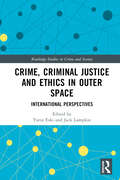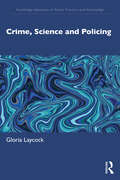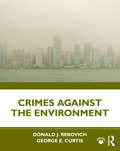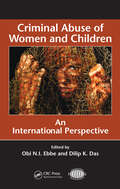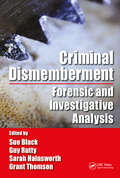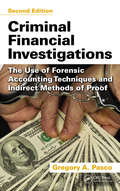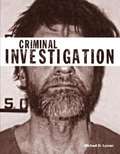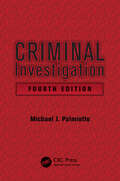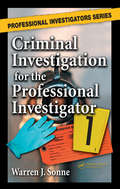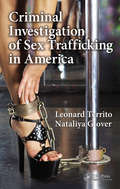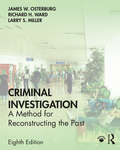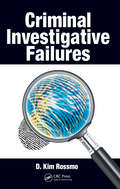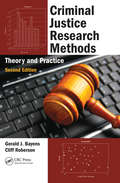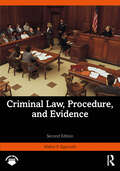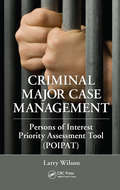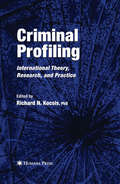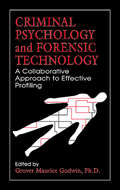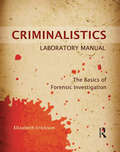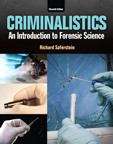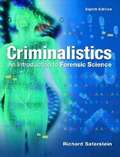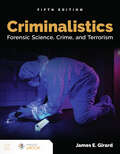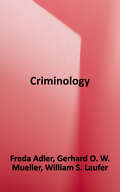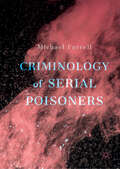- Table View
- List View
Crime, Criminal Justice and Ethics in Outer Space: International Perspectives (Routledge Studies in Crime and Society)
by Yarin EskiBreaking new ground in criminology, this book reflects on the expansion of outer space endeavours, the new pathways this presents for crime, challenges to Earth-based conceptions of justice, and the ethical issues raised.This book is the first edited collection of chapters focused on how to prepare for, address and respond to, instances of criminal and harmful behaviour in (and related to) outer space. It also considers what criminal justice might look like in outer space, and how the important arena of ethics might play a pivotal role in helping overcome problems related to crime and crime control. The book comprises 24 chapters from authors spanning six continents, giving a truly international dimension to the first anthology relating to the intersection of space criminology, space criminal justice and space ethics. It is this international dimension that is essential to the development of a holistic understanding of crime, criminal justice and ethics in outer space.Exploring recent topics, including the dark origin of space exploration, expansion of satellite industries, space tourism, asteroid mining and human settlement on the Moon and Mars, the book will appeal to space professionals, and students and researchers working in criminology, critical security studies, law, and ethics.
Crime, Science and Policing
by Gloria LaycockThis book offers an introduction to crime science; it is specifically for police and security professionals. Written by one of the founders of crime science and an expert in crime reduction, it considers the unique characteristics of the approach, its applicability to the control of crime, disorder and terrorism, and the importance of experimentation and the testing of new ideas to build a knowledge base for ethical policing. Core content includes: The basics of crime science in concept, theory and practice; Methods of research and assessment used by crime scientists; Crime science and policing, including its application to volume crimes, serious crimes and investigation; Legitimacy and public compliance; Policing, science, and future crimes. This book is essential reading for all students of professional policing, as well as those interested in crime and its control, reduction, and prevention.
Crimes Against the Environment
by Donald J. Rebovich George E. CurtisCrimes Against the Environment explains the seriousness of the threat posed by pollution, its roots, how it has evolved, how it differs across the planet, and how society has endeavored to create and enforce laws directed at its control. Rebovich and Curtis begin with an overview of hazardous waste, the industries that produce toxins, available methods of waste treatment, and the legal environment of environmental crime. They examine the forces driving criminal behavior and the methods offenders adopt, as well as protections against polluters and their effectiveness. The book concludes with an examination of environmental justice in the United States and globally, and looks ahead to the future of crime control and prevention in this arena. Case studies and discussion questions offer further perspective on these challenging issues of environmental integrity. This text serves undergraduate or early-stage graduate students majoring in criminal justice, environmental science, sociology, and political science, and could also serve as a resource for professionals in environment-related occupations.
Criminal Abuse of Women and Children: An International Perspective (International Police Executive Symposium Co-Publications)
by Dilip K. Das Obi N.I. EbbeThe abuse of women and children transcends geographical boundaries as well as economic, cultural, religious, political, and social divisions. Comprised of the work of more than 20 academics and practitioners from around the world, Criminal Abuse of Women and Children documents the atrocities that have been committed against these victims from ancie
Criminal Dismemberment: Forensic and Investigative Analysis
by Sue Black Guy Rutty Sarah V. Hainsworth Grant ThomsonCriminal Dismemberment is the first book to examine dismemberment as a phenomenon in the context of criminal acts. While the number of such dismemberment cases in any given country is often small, the notion of dismemberment captures the imagination, often leading many to question the motivations as to why anyone would perpetrate such an unnatural act. The act of dismemberment, in its original form, referred to cutting, tearing, pulling, wrenching or otherwise separating the limbs from a living being as a form a capital punishment. In today’s society, it has become associated most frequently with the criminal act of sectioning the remains of the dead in an attempt to conceal the death and dispose of the remains or make the process of identification of the deceased more difficult to achieve. Drawing on expertise from leading forensic anthropologists, pathologists, and forensic materials engineers, the book brings together much of the literature on criminal dismemberment—viewing it from the investigative, forensic, and social science perspectives. Key features include: Psychological analysis of the perpetrator Detailed examination of case studies, anonymized from recent investigations Difficulties encountered in a dismemberment investigation Tool mark analysis, including knives and saws, accompanied by over 120 detailed, full-color illustrations and photographs Serves as a unique and useful resource in the investigation of dismembered human remains The diverse backgrounds of the contributors offers a thorough account of such topics as the history of dismemberment, the forensic pathology in such cases, the importance of developing a common vocabulary in terminology used, the legal admissibility in dismemberment cases. As such, Criminal Dismemberment will serve as a comprehensive reference for students and practitioners alike.
Criminal Financial Investigations: The Use of Forensic Accounting Techniques and Indirect Methods of Proof, Second Edition
by Dale L. June Gregory A. PascoUnderstanding the financial motivations behind white collar crime is often the key to the apprehension and successful prosecution of these individuals. Now in its second edition, this volume provides direct instruction on the how to aspects of criminal financial investigations, taking readers through the different approaches used in gathering evidence and demonstrating how to present circumstantial evidence to a judge or jury in a simple and convincing manner. Written by a former Special Agent with the Criminal Investigation Division of the U.S. Internal Revenue Service, the book sets out a methodology enabling readers to identify, pursue, and successfully prosecute white collar crime.
Criminal Investigation
by Michael D. LymanCriminal Investigation: A Brief Introduction is written in an innovative "brief" format, making it more easily understood by students and more user-friendly for instructors. It presents crime detection as a field that relies heavily on past experiences of investigators as well as recent practical, forensic, and technological innovations. This new text blends scientific theories of crime detection with a practical approach to criminal investigation and follows the belief that sound criminal investigations depend understanding the science of crime detection procedures and the art of anticipating human behavior.
Criminal Investigation
by Michael J. PalmiottoCriminal investigators need broad knowledge of such topics as criminal law, criminal procedure, and investigative techniques. The best resource for these professionals will distill the needed information into one practical volume. Written in an accessible style, the fourth edition of Criminal Investigation maintains the same reader friendly approac
Criminal Investigation for the Professional Investigator (Professional Investigators Series)
by BCPI, CLI, SonneAimed at the busy professional who aspires to become certified in the field, Criminal Investigation for the Professional Investigator details essential techniques a trained investigator will be called upon to perform during the course of a career. The book is authored by a veteran of the NYPD who went on to launch and operate two successful private investigation agencies. It covers crime scenes, death investigations, the art of interrogation, and specific criminal investigations. It also provides important strategies for making arrests and testifying in courtrooms, details the most effective investigative tools to use, and explains the role of criminal defense investigators.
Criminal Investigation of Sex Trafficking in America
by Leonard Territo Nataliya GloverHuman trafficking is the third largest business for organized crime worldwide, next to illegal weapons trading and drugs. Written by well-respected criminal justice scholars, this book examines the criminal investigation of sex trafficking. Providing a multidisciplinary exploration of this topic, the authors discuss:International and national persp
Criminal Investigation: A Method for Reconstructing the Past
by Larry S. Miller James W. Osterburg Richard H. WardA classic in the field, Criminal Investigation: A Method for Reconstructing the Past, Eighth Edition, presents the fundamentals of criminal investigation and provides a sound method for reconstructing a crime based on three major sources of information: people, physical evidence, and records. By breaking information sources into these three major components, the book provides a logical approach that helps students remember and achieve mastery of these essentials. More than a simplistic introductory text, yet written in an easy-to-read, user-friendly format, it offers a broad treatment of criminal investigation. Updated and streamlined since the prior edition, the text covers the foundations and principles of criminal investigation, analysis of specific crimes, and explores special topics including enterprise crime, arson and explosives, computers and technological crime, increasing threats and emerging crime, and terrorism and urban disorder. This discussion of contemporary and future criminal activity teaches students facts about the present as well as the skills to stay current in a rapidly changing field. This book is indispensable for core courses in criminal investigation. Chapters include a variety of helpful charts, tables, and illustrations, as well as discussion questions that provide focus on the most important points. A glossary provides definitions for terms that have specialized meanings, and an online companion site offers an array of resources for both students and instructors.
Criminal Investigation: The Art And The Science
by Michael LymanCriminal Investigation: The Art and the Science ― by nationally recognized criminal investigation expert Michael Lyman ― is a clear, thorough examination of the fundamentals of criminal investigation and forensic science, as currently practiced throughout the US. It explores past experiences of investigators alongside forensic and technological innovations. Paralleling the steps of the criminal investigation, the 9th edition has been extensively updated with new and revised material, a new chapter on investigating officer-involved shootings, and updated case studies and graphics.
Criminal Investigative Failures
by D. Kim RossmoAvoid Major Investigative TrapsWhat causes competent and dedicated investigators to make avoidable mistakes, jeopardizing the successful resolution of their cases? Authored by a 21-year police veteran and university research professor, Criminal Investigative Failures comprehensively defines and discusses the causes and problems most common to faile
Criminal Justice Research Methods: Theory and Practice, Second Edition
by Cliff Roberson Gerald J. BayensThe study of research methodologies can be daunting to many students due to complex terminology, mathematical formulas, and lack of practical examples. Now in its second edition, Criminal Justice Research Methods: Theory and Practice offers a straightforward, easy-to-understand text that clarifies this complex subject matter, keeping perplexing research language and associated complexities to a minimum and ensuring that students get a practical grasp of this essential topic.The authors discuss scientific inquiry, establishing a framework for thinking about and understanding the nature of research. They examine various types of research methods in the broad categories of quantitative, qualitative, and evaluation designs and provide coverage of analytical and experimental research designs. The book also examines survey methods, survey instruments, and questionnaires, including wording, organization, and pretesting. It describes the fundamental characteristics of the qualitative approach, setting the stage for an in-depth discussion of the participant observation and case study methods of research. Other topics include ethical standards of conduct, topic selection, literature review, and guidelines for writing a research report or grand proposal. The second edition features updated examples, reworked exercises, additional discussion points, and new research-in-action sections.Defining a clear approach to the study of research, the book enables student experiencing their initial exposure to this subject to be fundamentally prepared to be proficient researchers in criminal justice and criminology.
Criminal Law, Procedure, and Evidence
by Walter P. SignorelliProviding a complete view of U.S. legal principles, this book addresses distinct issues as well as the overlays and connections between them. It presents as a cohesive whole the interrelationships between constitutional principles, statutory criminal laws, procedural law, and common-law evidentiary doctrines. This fully revised and updated new edition also includes discussion questions and hypothetical scenarios to check learning. Constitutional principles are the foundation upon which substantive criminal law, criminal procedure law, and evidence laws rely. The concepts of due process, legality, specificity, notice, equality, and fairness are intrinsic to these three disciplines, and a firm understanding of their implications is necessary for a thorough comprehension of the topic. This book examines the tensions produced by balancing the ideals of individual liberty embodied in the Constitution against society’s need to enforce criminal laws as a means of achieving social control, order, and safety. Relying on his first-hand experience as a law enforcement official and criminal defense attorney, the author presents issues that highlight the difficulties in applying constitutional principles to specific criminal justice situations. Each chapter of the text contains a realistic problem in the form of a fact pattern that focuses on one or more classic criminal justice issues to which readers can relate. These problems are presented from the points of view of citizens caught up in a police investigation and of police officers attempting to enforce the law within the framework of constitutional protections. This book is ideal for courses in criminal law and procedure that seek to focus on the philosophical underpinnings of the system.
Criminal Major Case Management: Persons of Interest Priority Assessment Tool (POIPAT)
by Larry WilsonIn high-profile investigations, when the suspect pool is very large, resources are unduly strained unless the pool can be narrowed down to the most likely offenders. The Persons of Interest Priority Assessment Tool (POIPAT) provides an objective and consistent means of establishing a priority ranking of suspects or persons of interest in any invest
Criminal Profiling: International Theory, Research, and Practice
by Richard N. KocsisIn this book, renowned profiler Dr. Richard Kocsis presents a distinct approach to profiling called Crime Action Profiling or CAP. The volume explains the scope and methodology employed in the studies that the author has undertaken over the past decade and a half. CAP adopts the view that profiling essentially represents a psychological technique that has its foundations in the disciplinary knowledge of forensic psychology.
Criminal Psychology and Forensic Technology: A Collaborative Approach to Effective Profiling
by Grover Maurice GodwinOffender profiling has been developing slowly as a possible investigative tool since 1841 and the publication of Edgar Allen Poe's The Murder in the Rue Morgue. In this book, detective C. Auguste Dupin demonstrates the ability to follow the thought patterns of a companion while they stroll through Paris for 15 minutes without speaking a word. Today
Criminalistics Laboratory Manual: The Basics of Forensic Investigation
by Elizabeth EricksonThe Criminalistics Laboratory Manual: The Basics of Forensic Investigation provides students with little to no prior knowledge of forensic science with a practical crime scene processing experience. The manual starts with an original crime scene narrative setting up the crime students are to solve. This narrative is picked up in each of the forensic science lab activities, tying each forensic discipline together to show the integrated workings of a real crime lab. After the completion of all of the exercises, the student will be able to solve the homicide based on forensic evidence.
Criminalistics: An Introduction to Forensic Science
by Richard SafersteinThis best-selling text, written for the non-scientist, is appropriate for a wide variety of students, including criminal justice, law enforcement, law, and more! Criminalistics: An Introduction to Forensic Science, 11e, strives to make the technology of the modern crime laboratory clear and comprehensible to the non-scientist. The nature of physical evidence is defined, and the limitations that technology and current knowledge impose on its individualization and characterization are examined. By combining case stories with applicable technology, Criminalistics endeavors to capture the pulse and fervor of forensic science investigations. A major portion of the text centers on discussions of the common items of physical evidence encountered at crime scenes. These chapters include descriptions of forensic analysis, as well as updated techniques for the proper collection and preservation of evidence at crime scenes. Particular attention is paid to the meaning and role of probability in interpreting the evidential significance of scientifically evaluated evidence.
Criminalistics: An Introduction to Forensic Science (8th Edition, College Version)
by Richard SafersteinThe text covers the comprehensive realm of forensics and its role in criminal investigations. Physical evidence collection and preservation techniques are examined in detail including chapters on Computer Forensics and DNA.
Criminalistics: An Introduction to Forensic Science (8th Edition, High School Version)
by Richard SafersteinIn this new edition of Criminalistics, the noted forensic scientist Richard Saferstein brings the reader into the crime lab for a firsthand look at the role of science in the criminal justice system. Criminalistics focuses its attention on the up-to-date technologies police rely on to apprehend criminal perpetrators and to link them through trace evidence to crime scenes. This new edition emphasizes the latest DNA profiling technologies, which include STR and mitochondrial DNA. The book details how the creation of a new nationwide DNA data bank has been designed to apprehend the mobile criminal. Today, the ability to detect less than one-billionth of a gram of DNA means that forensic scientists can extract critical information at crime scenes from stamps and envelopes licked with saliva, a cup or can that has come in contact with a person's lips, chewing gum, the sweat band of a hat, or a bed sheet containing an individual's skin cells.
Criminalistics: Forensic Science, Crime, and Terrorism
by James E. GirardCriminalistics continues to set the standard for modern forensic methods and investigative techniques in a new, updated fifth edition. Beginning at the crime scene and proceeding to the forensic laboratory, the text walks the reader through the entire forensic investigation. Students learn how to accurately identify, gather, and analyze multiple types of evidence by examining actual crimes that were solved using the techniques presented. The Fifth Edition features new contemporary case studies and updated statistics. Also, the section about terrorism has been updated and expanded to include important terrorism-related topics: agroterrorism, the forensic analysis of internet data, cyberterrorism, explosives, weapons of mass destruction, and the techniques used to identify them. The most comprehensive and accessible text of its kind, Criminalistics: Forensic Science, Crime, and Terrorism, Fifth Edition is a practical, student-friendly introduction to this exciting science.
Criminology
by Freda Adler Gerhard O. W. Mueller William S. LauferCriminology is a young discipline. In fact, the term "criminology" is only a little more than a century old. But in this brief time, criminology has emerged as an important social and behavioral science devoted to the study of crime and criminal behavior, and the society's response to both. <p><p>Criminology fosters theoretical debates, contributes ideas and constructs, develops and explores new research methodologies, and suggests policies and solutions to a wide range of crime problems that dramatically affect the lives of countless people in the United States and around the world. Problems as vital and urgent as those addressed in this book are challenging, exciting, and, at the same time, disturbing and tragic. Moreover, these problems are immediately relevant to all of our lives. This is especially true today, when crimes here and abroad touch so many lives, in so many ways. <p><p>Our goal with this book has been, and remains, to discuss these problems, their origins, and their possible solutions in a clear, practical, straightforward fashion that brings the material to life for students. We invite faculty and students alike to join the authors' in traveling along criminology's path, exploring its expanding boundaries, and mapping out its future.
Criminology of Serial Poisoners
by Michael FarrellThis book examines serial homicidal poisonings in the modern era, to improve our contemporary understanding of poisons, poisoners, and investigation. Drawing on cases of serial poisoning from around the world, the book defines key terms, examines theories and explanations of serial homicide in relation to serial poisoning, explores the features of the poisons and examines the demographic characteristics of perpetrators of serial poisoning and their victims. It considers healthcare serial poisoning as a specific issue. Overall, it provides an outline for developing a criminology of serial poisoning homicide.
